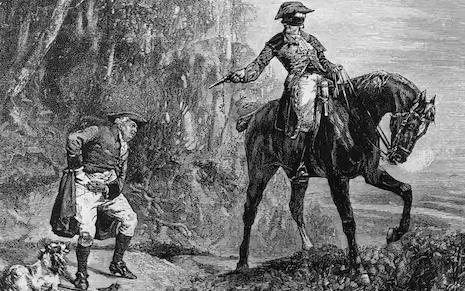Victorian Urban Legend: Doppelganger April 8, 2018
Author: Beach Combing | in : Modern , trackbackDoppelganger and Familiar Robber
This is a very unusual story and has two acts. Note that it is put here for the familiar robbers story in the second part: the subject of two previous posts, one from the US one from Spain. But is the doppelganger tale also an urban legend? The story is messy. The confusing double use of a coachman is particularly distracting.
The First Act
‘More than sixty years ago,’ said my friend, a lady, whom I am proud to call by that name, in memory of my deceased friend, her husband, the Master of English Wit and Sense – ‘my mother and sister were robbed by two highwaymen—myself a little girl, in the carriage with them. The robbery naturally became a subject of conversation for some time among our country neigbours. Our adventure called forth similar narratives and among them, one case of personal identy [sic] which is very remarkable. It was related by our neighbour Mr Manners (I will call him Mr Manners)[1] to my mother. Mr Manners was walking over Westminster Bridge with his intimate friend Mr Deacon (I substitute another name for a real one) when suddenly a stage coachman sprang from his box, rushed at Mr Deacon, and seized him by the collar. ‘You are the man who robbed the mail I drove such a night.’ Mr Deacon, smiling, said, ‘My good man you are quite wrong this friend of mine will soon convince you that l am a gentleman, and totally incapable of such an act.’
‘No! That’s no go – that won’t do for me. I thought it was you the moment saw you; but now when I hear you speak, I am positive it. You must, and shall go, with me before a Magistrate. The two gentlemen unhesitatingly went with him. The coachman swore so positively to Mr. Deacon being the man, that the magistrate had no alternative but to commit him for trial. (In those days, as you know, a convicted highwayman was hanged.) Mr. Deacon was sent to Newgate. As he was a man of careless habits, he could by no means recall the monotonous events of the lounging life he led; but he and his friends felt that the affair began to assume a serious aspect, so that he directed that all his papers might be conveyed to him, in order, that he make every desirable preparation in case of the worst that might ensue.
His friend Mr. Manners often said: ‘Is it impossible for you to recall where you were on this day?’
‘I cannot recollect it is above six weeks since, and I never kept any journal.’
The day appointed for the trial was drawing near. On turning over some apparently unimportant papers his prison, Deacon met with one, on the outside of which he had noted his having dined with a party of friends and that they had not separated till one o clock in the morning (he was man of very early habits). The mail was robbed at twelve. Here was a complete alibi; but every one of the parties present at this convivial meeting were in Scotland. The trial was postponed with difficulty, until they could be summoned.
Second Act
In the meantime Sir Lionel Lloyd’s coachman was taking up for robbing his master. Sir Lionel Lloyd was awakened in the night by a man at his bedside who, holding a pistol at his head, commanded him, on pain of death, to deliver his keys and property. He had lately received his rents. The man’s lace was striped with black. Sir Lionel, unresistingly, gave him his keys; but he said, I beg you will make no noise, for I have an old and valuable servant, my coachman, who is very ill, and I am very unwilling that he should be unnecessarily agitated. The man went to the bureau, rifled it of its valuable contents, and silently withdrew. The next day Sir Lionel, looking over the scattered wreck of his papers, found on the ground where many of them had been thrown, a printed envelope that had contained Court Plaster. He instantly recollected the black stripes on the robber’s face. He walked to the village shop, and asked if they had sold any quantity of Court Plaster. ‘Yes, sir, we sold several papers to your coachman.’
A constable was sent for, and an hour after Sir Lionel had driven [sic], to the shop, the man was identified and seized.
‘I came into your room,’ he afterwards said, ‘with a fixed determination to kill you, but your interceding for me in my supposed illness quite disarmed me.’
‘ When committed to Newgate, upon this clear statement of robbery, he subsequently owned that it was he who committed the robbery of which Mr Deacon was accused. Mr Deacon was therefore released. When he was about to quit the prison, Mr Manners, his faithful friend, said, before leaving this dreadful place we must see your likeness and they were admitted to his cell. The moment Deacon saw him he fainted away, as if he had been shot. Mr Manners, when his friend recovered, said to him, Although I am so intimate with you, I could not have believed, had I met this man anywhere, that it was not yourself. Had any doubt crossed me, the moment I heard him speak, I could no longer have had one.’ The real culprit, I need not add, was hanged (Anon 1853)
Can anyone help with any parallels: drbeachcombing AT gmail DOT com
[1] I assume this is not his real name. Note this is now officially a friend of a friend story.



